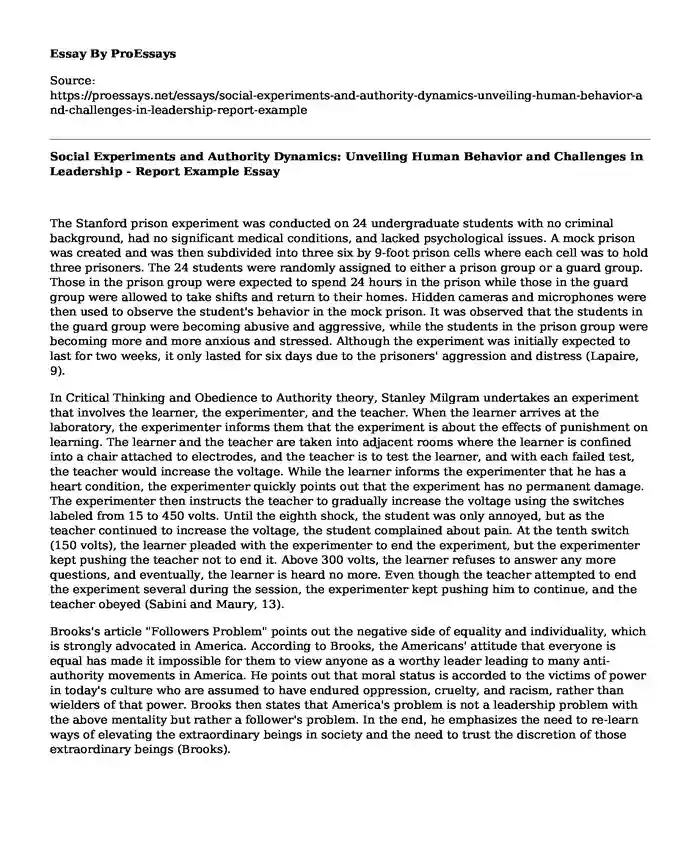The Stanford prison experiment was conducted on 24 undergraduate students with no criminal background, had no significant medical conditions, and lacked psychological issues. A mock prison was created and was then subdivided into three six by 9-foot prison cells where each cell was to hold three prisoners. The 24 students were randomly assigned to either a prison group or a guard group. Those in the prison group were expected to spend 24 hours in the prison while those in the guard group were allowed to take shifts and return to their homes. Hidden cameras and microphones were then used to observe the student's behavior in the mock prison. It was observed that the students in the guard group were becoming abusive and aggressive, while the students in the prison group were becoming more and more anxious and stressed. Although the experiment was initially expected to last for two weeks, it only lasted for six days due to the prisoners' aggression and distress (Lapaire, 9).
In Critical Thinking and Obedience to Authority theory, Stanley Milgram undertakes an experiment that involves the learner, the experimenter, and the teacher. When the learner arrives at the laboratory, the experimenter informs them that the experiment is about the effects of punishment on learning. The learner and the teacher are taken into adjacent rooms where the learner is confined into a chair attached to electrodes, and the teacher is to test the learner, and with each failed test, the teacher would increase the voltage. While the learner informs the experimenter that he has a heart condition, the experimenter quickly points out that the experiment has no permanent damage. The experimenter then instructs the teacher to gradually increase the voltage using the switches labeled from 15 to 450 volts. Until the eighth shock, the student was only annoyed, but as the teacher continued to increase the voltage, the student complained about pain. At the tenth switch (150 volts), the learner pleaded with the experimenter to end the experiment, but the experimenter kept pushing the teacher not to end it. Above 300 volts, the learner refuses to answer any more questions, and eventually, the learner is heard no more. Even though the teacher attempted to end the experiment several during the session, the experimenter kept pushing him to continue, and the teacher obeyed (Sabini and Maury, 13).
Brooks's article "Followers Problem" points out the negative side of equality and individuality, which is strongly advocated in America. According to Brooks, the Americans' attitude that everyone is equal has made it impossible for them to view anyone as a worthy leader leading to many anti-authority movements in America. He points out that moral status is accorded to the victims of power in today's culture who are assumed to have endured oppression, cruelty, and racism, rather than wielders of that power. Brooks then states that America's problem is not a leadership problem with the above mentality but rather a follower's problem. In the end, he emphasizes the need to re-learn ways of elevating the extraordinary beings in society and the need to trust the discretion of those extraordinary beings (Brooks).
Works Cited
Brooks David. “The Follower Problem.” The New York Times, June 11. 2012. https://www.nytimes.com/2012/06/12/opinion/brooks-the-follower-problem.html
Lapaire, Jean-Rémi. "The Grammar of Prison Violence: Revisiting the Stanford Prison Experiment (1971)." (2017). https://halshs.archives-ouvertes.fr/halshs-01628827/document
Sabini, John, and Maury Silver. "Critical thinking and obedience to authority." National Forum. Vol. 65. No. 1. Honor Society of Phi Kappa Phi, 1985. https://search.proquest.com/openview/7d980d7dd67c40d849469a9d662f8a8d/1?pq-origsite=gscholar&cbl=1820941
Cite this page
Social Experiments and Authority Dynamics: Unveiling Human Behavior and Challenges in Leadership - Report Example. (2023, Dec 16). Retrieved from https://proessays.net/essays/social-experiments-and-authority-dynamics-unveiling-human-behavior-and-challenges-in-leadership-report-example
If you are the original author of this essay and no longer wish to have it published on the ProEssays website, please click below to request its removal:
- AutoZone Case Analysis Management Paper
- Why Are Conservatives Trying to Destroy the Voting Rights Act?
- Research Paper on Self-Esteem and Life Satisfaction
- Essay Sample on Causes of the Financial Crisis
- Essay Example on FORD's Transformation: Crafting a New Vision.
- Mr. Davis' Psychosocial Evaluation Case Study: Assessing Social & Mental Well-Being
- Essay Sample on Jesse Williams: BET Humanitarian Award Winner & Social Critic







